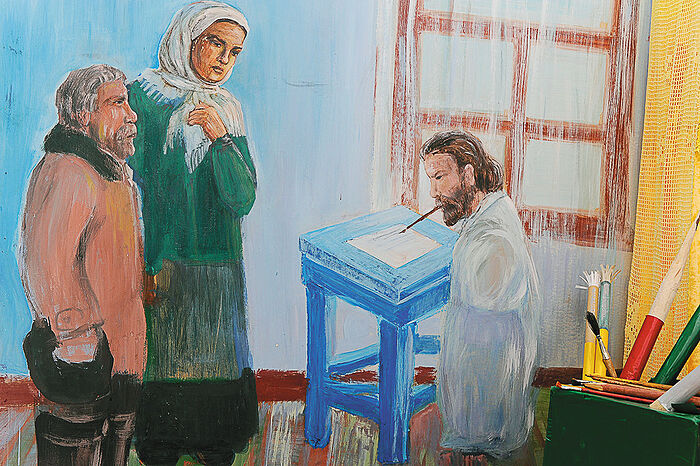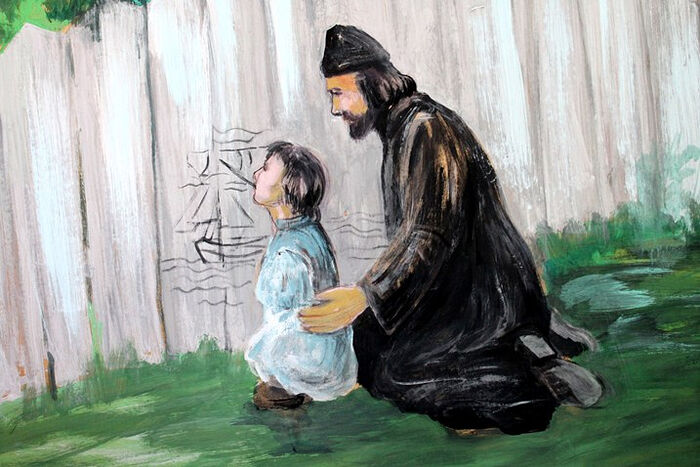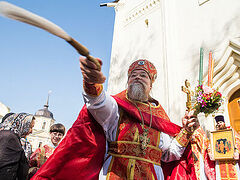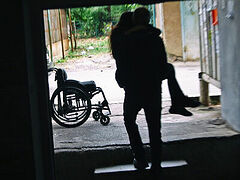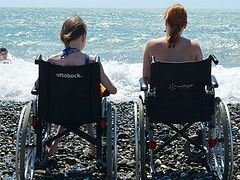The Dormition Church of Pyukhtitsa convent has a small icon of St. George the Victory-Bearer defeating a fearsome serpent. Few people know that it was painted by Gregory Zhuravlev, a well-known iconographer in pre-revolutionary Russia—a man born without arms or legs.
This amazing man came into the spotlight when, in 1963, the Serbian art historian and restorer Zdravko Kajmakovic discovered an icon depicting Sts. Cyril and Methodius in the Yugoslavian village of Paracin. The Russian inscription on the back read:
“This icon was painted in the Samara Province, Buzuluk uyezd, Utevskaya volost1, in the village of the same name, by the peasant Gregory Zhuravlev, an armless and legless man, with his teeth, in 1885 on July 2.”
The scientist later wrote the following about his find:
“An elaborate and delicate work, and at first glance I attributed it to the work of an academically-trained iconographer, its inscription having been written by an nameless monk. I am glad that there was such a phenomenon as Zhuravlev, who after overcoming the cruelty of nature, managed to rise to the enviable heights of fine art."
A crippled baby
Grigory Zhuravlev was born in 1858 to a peasant family in the remote village of Utevka in the Volga Region, not far from Samara. When his mother realized that she delivered a crippled baby (without arms and legs, just little stumps in their place), she decided that the Lord was punishing her and her husband for something. For a long time, she remained inconsolable in her grief, while her neighbors, feeling sorry for the poor infant, would whisper amongst themselves: “God has wronged him. He hasn’t got long to live.” But this “goner” had no thought of leaving this world without the will of his heavenly Father; and he constantly reminded everyone of himself with his shrill crying...
Eight days after his birth, they took their baby to church. The baby was baptized with the name Gregory. His godfather Dyad’ka2 Yakim, taking the boy from the hands of the church’s rector, grumbled: “What kind of a baby is this, the only thing he’s got is a mouth!” Father Vasily shook his head disapprovingly:
"We, Yakimushka, don’t know yet what God's Providence is for this child... Wait, you just wait, what if it’s not you who will take care of him, but he who will take care of you... God can do what man cannot.”
The whole village took pity on Grisha. To feel pity is to love with all one’s heart. Everyone tried their best to please the crippled baby boy, to help him, or to give him a tasty treat. Even the village bullies never hurt or teased him. Since Grishenka’s father didn’t return from the Caucasian war alive, the “big-hearted village world” took care of the large family with a handicapped child—the neighbors ploughed and sowed their parcel of land, harvested the crops, while Batiushka Vasily, along with the retired general Prince Tuchkov, not only offered him a coin here and there, but also gave an eagerly-smiling Grisha the opportunity to study with kind teachers. The boy learned how to write with a quill held in his teeth—and folks flocked to the Zhuravlevs asking either to write petitions to authorities or letters to family members.
A gift from God!
Grisha’s extraordinary abilities became apparent early on, proving to everyone that not only was he not offended by God, but on the contrary, God had bestowed a talent upon him: As he crawled around his yard, he’d often clench a twig in his teeth and spend hours drawing people, animals, and plants on the sand…
These drawings baffled people, while Grisha's line of reasoning amazed even the old men, because with his childlike mind, he could penetrate deep into the very essence of things and events. The child looked at God's creation with the eyes of a mature man, and because of his suffering, he understood much that others failed to even notice.
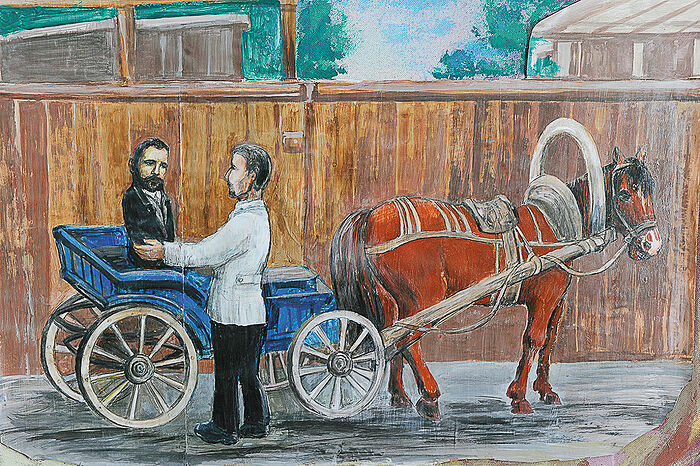 Gregory and Afanasy Zhuravlev. Drawing by Ludmila Kulagina
Gregory and Afanasy Zhuravlev. Drawing by Ludmila Kulagina
Grisha’s extraordinary abilities became apparent early on, proving to everyone that not only was he not offended by God, but quite the contrary
A soul filled with light always reaches up to God. And so Grisha always felt drawn towards the church of God. He kept asking to go there to “bob his head at the Mother of God.” His brother and sister, who were always nearby to take care of him, would often take him in his wheelchair to a small church. Pushing his stroller through a thick wall of people, Grisha was taken to every icon and lifted up to venerate them. The little boy would kiss the holy icon and tears would roll down his cheeks... The congregation would also weep at this sight, and their tears cleansed their souls.
Prince Tuchkov, never leaving the Zhuravlev family without his mercy, sent Grisha to study at school in Samara.
His classmates art first shunned the “stubby” one, but over time, they grew to love him for his cheerful disposition and quick mind. He studied happily and graduated from the gymnasium with honors.
The heroic act of his whole life
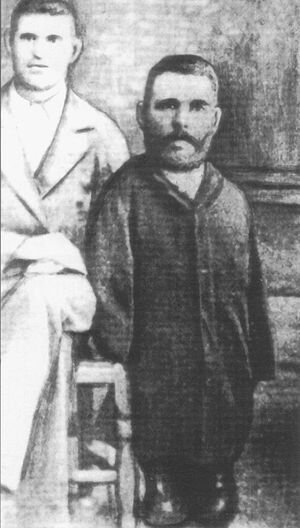 Gregory Zhuravlev and brother Afanasy. Photo from the late 19th century Gregory learned the basic techniques of professional brushwork at the icon painting studio of Alexey Ivanovich Seksyaev. Grisha had his own separate table placed near the window equipped with attached leather straps. Strapped to the table with wide straps and holding a brush in his teeth, he would become immersed in a completely different realm—the world of bright spiritual experiences, where (thanks to his God-given talent!) the Holy Gospel would vibrantly come alive through the paints applied to a simple cypress board.
Gregory Zhuravlev and brother Afanasy. Photo from the late 19th century Gregory learned the basic techniques of professional brushwork at the icon painting studio of Alexey Ivanovich Seksyaev. Grisha had his own separate table placed near the window equipped with attached leather straps. Strapped to the table with wide straps and holding a brush in his teeth, he would become immersed in a completely different realm—the world of bright spiritual experiences, where (thanks to his God-given talent!) the Holy Gospel would vibrantly come alive through the paints applied to a simple cypress board.
After five years of painstaking work, Gregory Zhuravlev could confidently paint icons and decorate churches. Lying in a special cradle cage, the painter even managed to decorate the dome of a stone church built in honor of the Holy Trinity in Utevka. It was a labor to the point of collapse from severe pain. After two or three hours of work, the artist would get such a painful spasm of the jaw muscles that it was impossible to unclench his teeth and pull the brush out of his mouth. His lips would bleed, his front teeth ached, practically ground down to the roots, and bloody chaffing formed on his shoulder blades and the back of his head from lying in the cradle... But how great was the power of his spirit! It was the heroic act of his life.
In a private archive of the Governor General A.D. Sverbeyev, there was a letter from Zhuravlyov to Tsesarevich Nicholas, the future Russian Emperor, dated 1884:
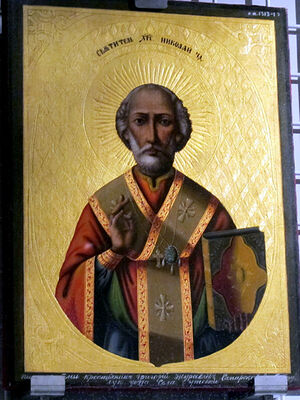 Icon of the Holy Hierarch Nicholas the Wonderworker presented as a gift to the Tsesarevich and the future Emperor Nicholas. Kept in the Hermitage Museum. Photo: chiffalis.livejournal.com “Your Imperial Highness, I humbly and sincerely beg Your Imperial Highness to allow me, Gregory Zhuravlev, a peasant from the Samara Province, Buzuluk uyezd, Utevka village, to wholeheartedly present to Your Imperial Highness an icon of the Holy Hierarch and Wonderworker Nicholas, which I have painted with my mouth instead of with hands; because, from birth, I had neither strength nor movement in my limbs. Your Imperial Highness, in Your Imperial Name, I humbly ask you to accept this icon, which I present to Your Imperial Highness with all my heart and love. I humbly ask You to take this icon dispatched to the attention of Your Imperial Name, since I have neither hands nor feet. And I painted this icon by the inspiration of the Almighty God Who made me see the Divine World...”
Icon of the Holy Hierarch Nicholas the Wonderworker presented as a gift to the Tsesarevich and the future Emperor Nicholas. Kept in the Hermitage Museum. Photo: chiffalis.livejournal.com “Your Imperial Highness, I humbly and sincerely beg Your Imperial Highness to allow me, Gregory Zhuravlev, a peasant from the Samara Province, Buzuluk uyezd, Utevka village, to wholeheartedly present to Your Imperial Highness an icon of the Holy Hierarch and Wonderworker Nicholas, which I have painted with my mouth instead of with hands; because, from birth, I had neither strength nor movement in my limbs. Your Imperial Highness, in Your Imperial Name, I humbly ask you to accept this icon, which I present to Your Imperial Highness with all my heart and love. I humbly ask You to take this icon dispatched to the attention of Your Imperial Name, since I have neither hands nor feet. And I painted this icon by the inspiration of the Almighty God Who made me see the Divine World...”
The Lord let the cripple “see the World of God” according to His Purpose!
According to all worldly standards, a man born without arms or legs should have become “the most miserable among men”. But the life of Gregory Zhuravlev, who loved Christ with all his heart and accepted His will, became in the Orthodox world an obvious manifestation of the spiritual law: “God’s strength is made perfect in weakness.”

